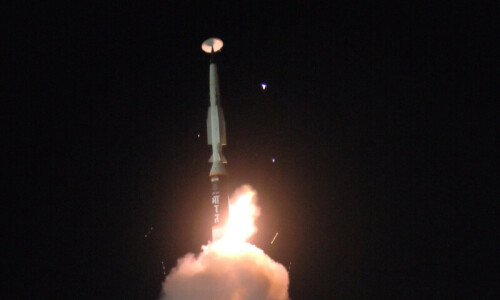
WASHINGTON: The Pentagon insists high-profile assaults by Afghan insurgents are a sign of a weakened enemy but former officials and analysts say Taliban tactics could undercut the effects of a US-led military campaign.
After a series of dramatic attacks, including a firefight outside the US embassy and the killing Tuesday of former Afghan president Burhanuddin Rabbani, US Defense Secretary Leon Panetta said the insurgents were resorting to headline-grabbing violence because they had been defeated on the battlefield.
Panetta told senators Thursday the tactics were the “result of a shift in momentum in our favor and a sign of weakness in the insurgency.”
But former officials and experts are less upbeat about the course of the war, and say the insurgency has always employed assassination as a weapon to undermine the Afghan government's authority.
“Assassination is not a new tactic, but has been a key component of the Taliban's repertoire since they were formed in 1994,” said Seth Jones, a former defense official who worked with commanders in Afghanistan.
In the south, the focus of a surge in US troops, the Taliban has been damaged and pushed back in Helmand and Kandahar provinces, said Jones, echoing US military assessments.
The insurgency, however, still enjoys the lifeline of sanctuaries in Pakistan and has shifted some its operations outside the south, he said.
“My concern with some of the recent progress in Afghanistan is: unless the Taliban is effectively targeted in its sanctuaries in Balochistan and Karachi, are the gains in Afghanistan only temporary?” This is the million dollar question,” he told AFP.
The strategy for Afghanistan is largely modeled on the US troop “surge” in Iraq, and some American military leaders argue the trends are moving in a similar direction - with the insurgents now on the back-foot.
Major General Michael Flynn, who oversaw military intelligence in Afghanistan until last year, said the assassinations are not brand new but have “increased in scope and scale - probably in the past year.” And part of this is they don't have the capability to do the things they used to do only a couple of years ago,” Flynn said.
The insurgency used to take on Nato forces with large contingents. “We were fighting in some cases up to 50 to 100 guys,” Flynn said. “You don't see that anymore.”
Like insurgents in other wars, the Taliban seeks to strike at public perceptions, to sow doubts about the ability of the Afghan government to provide security or broker a peace deal, said Vanda Felbab-Brown of the Brookings Institution.
She said that “the assassination tactic is precisely the most rational policy for the Taliban right now and they would be crazy to be mounting attacks with massive forces because they would likely be slaughtered.”
Battlefield victories were not the ultimate aim and instead the insurgents were pursuing assassinations to “maintain pressure and fear,” she said.
“It's not just the assassination of very visible people but assassinations of district officials or people who cooperate with the US government or the (Hamid) Karzai government,” she said. “And it has a profound effect on how people feel about their security.”
The killing of Rabbani, who was leading Kabul's peace efforts, put the Pentagon in a difficult position, as it was clearly a setback but Panetta and other top officials warned against overstating its effect.
Anthony Cordesman of the Center for Strategic and International Studies, who advised the US commander in Afghanistan in 2009, said Friday the Obama administration needed to hold a frank public debate about war aims instead of engaging in “constant spin.”
US troops have made headway in the Taliban's former bastions in the south and taken out key insurgents, according to Cordesman. But the Afghan government remained anemic and it was not at all clear its security forces could hold on to cleared areas as Nato-led forces gradually withdraw through 2014.
“We may be winning tactically, but insurgents may be winning a battle of political attrition that will ultimately be strategically decisive,” Cordesman wrote in Friday's Washington Post.












































Dear visitor, the comments section is undergoing an overhaul and will return soon.